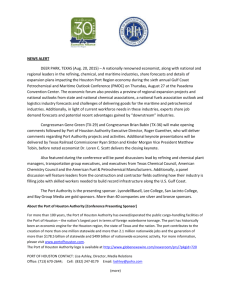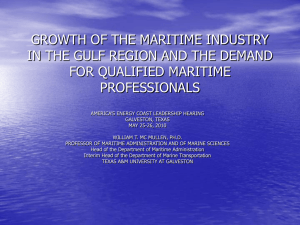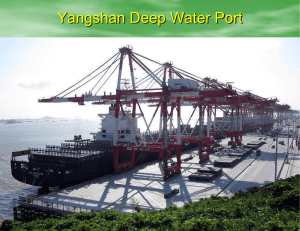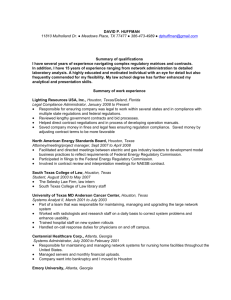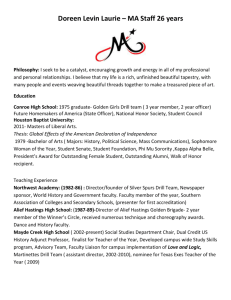Economic Alliance Ne.. - Winkler Public Relations
advertisement
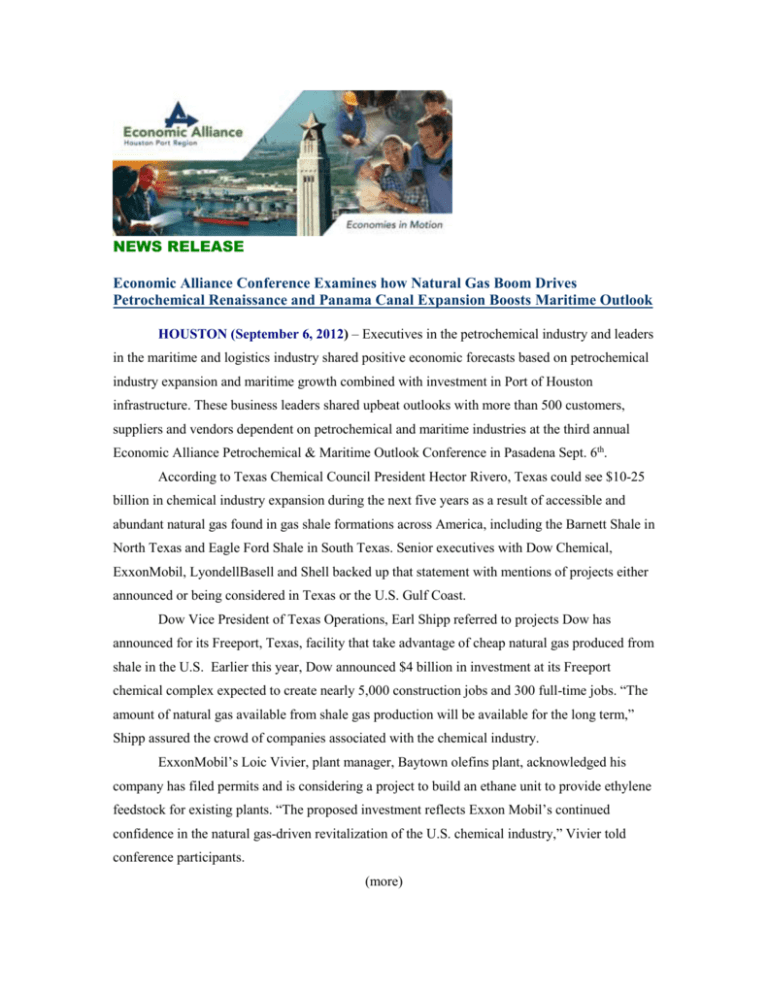
NEWS RELEASE Economic Alliance Conference Examines how Natural Gas Boom Drives Petrochemical Renaissance and Panama Canal Expansion Boosts Maritime Outlook HOUSTON (September 6, 2012) – Executives in the petrochemical industry and leaders in the maritime and logistics industry shared positive economic forecasts based on petrochemical industry expansion and maritime growth combined with investment in Port of Houston infrastructure. These business leaders shared upbeat outlooks with more than 500 customers, suppliers and vendors dependent on petrochemical and maritime industries at the third annual Economic Alliance Petrochemical & Maritime Outlook Conference in Pasadena Sept. 6th. According to Texas Chemical Council President Hector Rivero, Texas could see $10-25 billion in chemical industry expansion during the next five years as a result of accessible and abundant natural gas found in gas shale formations across America, including the Barnett Shale in North Texas and Eagle Ford Shale in South Texas. Senior executives with Dow Chemical, ExxonMobil, LyondellBasell and Shell backed up that statement with mentions of projects either announced or being considered in Texas or the U.S. Gulf Coast. Dow Vice President of Texas Operations, Earl Shipp referred to projects Dow has announced for its Freeport, Texas, facility that take advantage of cheap natural gas produced from shale in the U.S. Earlier this year, Dow announced $4 billion in investment at its Freeport chemical complex expected to create nearly 5,000 construction jobs and 300 full-time jobs. “The amount of natural gas available from shale gas production will be available for the long term,” Shipp assured the crowd of companies associated with the chemical industry. ExxonMobil’s Loic Vivier, plant manager, Baytown olefins plant, acknowledged his company has filed permits and is considering a project to build an ethane unit to provide ethylene feedstock for existing plants. “The proposed investment reflects Exxon Mobil’s continued confidence in the natural gas-driven revitalization of the U.S. chemical industry,” Vivier told conference participants. (more) Industry Expansion in Region Could Create 20,000 Construction Jobs (page 2) A final decision to move forward with the project would follow government approval. The project could start in 2016. ExxonMobil says the ethane unit project would create about 10,000 construction jobs. It would also add about 350 permanent jobs to a workforce of 6,500 full-time and contractor jobs in the Baytown area. Other companies have announced plans or are considering plant expansions. LyondellBasell plans to expand several plants in the region while Chevron announced new polyethylene plants near Sweeney and a hexane plant in Baytown. Projections for construction workers needed for these expansions will certainly top 20,000 contractors, according to Rivero. “The business environment in Texas provides a great place for our chemical companies to conduct business, employ a large number of skilled workers, and provide business for related companies that support and supply our industry,” said Rivero. Executive Director Colonel Leonard Waterworth outlined millions of dollars in Port of Houston projects for Barbours Cut, Bayport Terminal and the Turning Basin that will upgrade port facilities to handle increased traffic expected from the Panama Canal expansion. Many of the projects are needed to upgrade aging port facilities. The Port of Houston continues to be challenged securing adequate funding from the federal government for widening and deepening projects for the ship channel and the port terminals. “As goes this 25 mile stretch of bayou and its adjacent industrial neighborhoods, so goes the Texas economy,” said Chad Burke, president and CEO of Economic Alliance Houston Port Region. Burke said that Port of Houston, maritime and petrochemical industries directly and indirectly create more than 1 million jobs. Many companies and individuals dependent on the industry attended the conference to learn about new projects. Some challenges to expansion were acknowledge. Congressman Pete Olson reminded conference attendees that Washington, D.C. must provide support but not get in the way of the economic resurgence. “The Port of Houston contributes 100 of millions of dollars to the nation’s Harbor Maintenance Trust Fund. We must get more of that money returned to the Port of Houston for its widening and deepening projects and other infrastructure needs. We also need to be sure EPA and other government agencies safeguard the environment and protect workers and communities in a way that allows maritime and petrochemical growth, and creates good jobs. It is essential that we work with our high schools and community colleges to develop a qualified workforce that can provide skilled workers needed to build, maintain and operate these facilities.” (more) Industry and Community Colleges Working to Fill a Skills Gap Crisis (page 3) Dr. Brenda Hellyer, Chancellor of San Jacinto College and current chair of the Economic Alliance, agreed with Olson’s call for workforce development. “We have a skills gap crisis,” Hellyer declared. “Even though we see high unemployment, jobs are going unfilled partly because employers can’t find workers with the appropriate skills. “San Jacinto College and our community college partners in the area are working closely with the maritime and petrochemical industries to identify skills needed. Once we identify the need, we can provide immediate technical training and certifications, as well as long-term technical education through two-year associate programs to fill the necessary pipeline with skilled crafts workers.” Each year the Economic Alliance Petrochemical and Maritime Outlook Conference has topped prior year attendance. This year more than 500 people attended the forum. “As the economic development corporation for the Houston Port Region, the Economic Alliance feels it is critical to bring together stakeholders that create jobs and drive our state’s economy. Each year this conference provides insight on growth, trends and threats to our regional prosperity,” said Burke. “As home of the nation’s largest petrochemical and refining complex, and the nation’s largest port in foreign tonnage, the economic engine along the Houston Ship Channel accounts for $178.5 billion of total economic activity in Texas and is responsible for more than 1 million jobs in our state. No other region or industry can boast that kind of impact!” Burke added. - 30 - Contacts: Chad Burke, President & CEO, Economic Alliance Houston Port Region Telephone: (281) 867-1112 Cell: (713) 775-3103 Dennis Winkler, Winkler Public Relations Cell: (713) 259-0195 About the Economic Alliance Houston Port Region The Economic Alliance Houston Port Region provides professional economic development services on behalf of 16 communities surrounding the 25-mile Houston Ship Channel - home to one of the world’s most influential energy corridors and trade ports. The Economic Alliance role is to market and grow a vibrant regional economy. Additional Quotes: Captain Bill Diehl, President, Greater Houston Port Bureau "For 100 years the Port of Houston has grown and adapted to global market conditions. We know our port is crucial to Houston and Texas and by working together, we move more ships here than any other port in the United States. We're looking to continue that growth in the coming years with developments such as the completion of Panama's canal expansion project, shale gas and oil exploration in East Texas, and the increased needs of our region's booming population."
